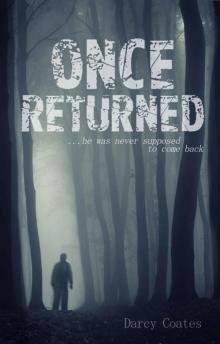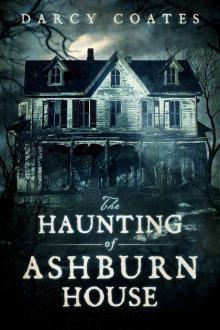- Home
- Darcy Coates
The Haunting of Ashburn House Page 3
The Haunting of Ashburn House Read online
Page 3
“You’ll get fat.” She pulled out a piece of the fish. “No, sorry, that’s wrong. You’ll get fatter.”
He scarfed down the morsel she offered him then licked around his mouth as he waited for more. She sighed and gave a fond smile as she shared the remainder of her fish with him. By the time they’d emptied the tin and Wolfgang settled down to lick the oil off its sides, the kettle was whistling.
She dropped the teabag into her cup, donned the gloves again, and pulled the steaming kettle off the fire. She poured the water with excruciating care, half-afraid that the heat alone would be enough to shatter the delicate floral beaker, and sighed in relief as she placed the pot on the mantel without any disasters.
For a minute, she considered getting the second tin of fish from the pantry—half of her dinner had ended up in the huge grey beast who had now returned to ignoring her—but she decided against it. She didn’t know how long it would take her to get to town, or how she would get to town for that matter, and felt it would be wiser to ration out the food until she had a system worked out.
It took—what, twenty minutes to drive from the town’s centre to here? That was at a slow speed, though. So maybe allow one or two hours to walk to town. Then the same amount of time to walk back. Uphill. While carrying shopping bags. She wrinkled her nose and blew steam off the top of the teacup. Looks like I might meet my New Year’s resolution to get fit after all.
Edith Ashburn must have had a way to get to the shops. There hadn’t been any vehicles parked at the front of the property, but she could explore around the back the following morning when the sun rose.
If Edith had owned a car, there was a good chance it had been given to someone else on her death or sold if she hadn’t owned it outright. If that was the case, Adrienne would have to figure out a solution for herself. She could buy a bike, but good bikes were expensive, and she had less than twenty dollars in her purse and nothing in her bank account. That would improve a little when her freelance-article-writing accounts were paid, but two clients were overdue on their bills and hadn’t replied to her emails in more than a week.
Wolfgang finished with the tin. He flopped onto his side and stretched so that his belly was facing the flames, and she thought she caught a faint rumble of contentment.
It must be nice to be a cat. No bills to pay. No difficult clients. No having to figure out how to say, “Send me my damn money!” in a pleasant way because if you’re rude they won’t hire you again and you can’t afford to lose any work.
She leaned back in the chair and closed her eyes. The fire’s heat felt amazing on her legs, and she took a second to realign her priorities. She had a house. It was old and smelt funny and was a long way from town, but holy heck, she had her own house. As long as the Wi-Fi worked well enough that she was able to submit her freelance articles on time, she could end up being very happy there. She thought she could grow fond of the town, too, and maybe even make some friends.
“And if no one wants to be my friend, I’ll just get another cat,” she said to Wolfgang. His front paws were making slow paddling motions and he kneaded the air. “I’ll get a dozen cats and give them all cutesy names like Muffin or Flopsy and become the crazy cat lady who lives on the hill. How do you like the sound of that?”
There was no response, not that she’d expected one, but at least the grey beast looked content. Adrienne smiled and chewed at the corner of her thumb as she watched the last minutes of daylight fade. Without having to pay rent, her freelance work should be more than enough to support her. She would just have to get through the first few lean weeks as jobs were processed and accounts fell due, then she could start rebuilding her savings to give Wolfgang and her some security.
A growl startled her. Wolfgang no longer lay on his side but had rolled onto his front and half risen. His ears flattened, and the fur on his tail, already fluffy, puffed out.
“Wolf?” Adrienne placed her cup on the side table and leaned forward. The cat’s eyes were saucer round and their pupils so large that almost none of the green irises remained visible. He faced the window closest to the fireplace, and his whiskers quivered as he exhaled a quiet hiss.
5
Portraits
She kept still, not breathing, and listened as hard as she could. The fire’s crackles were a steady song to her left. The floors above her emitted faint groans as the wind caused the wood to shift. And outside was perfectly silent.
That gave her pause. The birds had created a cacophony barely half an hour before. And even if they’d all fallen asleep, she would have expected some of the insects to maintain their song.
Wolfgang transformed into a streak of grey as he turned and flew into the nook between the bookcase and the piano. Chills climbed Adrienne’s arms as she watched her cat disappear. It wasn’t like Wolfgang to take flight from a threat.
It’s a new house. He’s going to be skittish for a few days. She rose and took a step towards the window. Outside was nearly pitch black, and all she could see was her own pale face and the fire’s glow reflected to her in the glass.
A pipe farther in the building rattled then fell still. The beams and supports above her head groaned more insistently as the wind buffeted them.
He probably saw a shadow and panicked. She moved nearer to the window, leaning so close to the smudged glass that she could feel its chill washing onto her cheek.
Outside was deathly quiet. She could make out the moon’s glow, blurred and muted by the thin clouds that hung across it, and the trees’ silhouettes against the sky. Scores of faintly glowing pinpricks were visible between the clouds, suggesting the heavens would be awash with stars on a clear night.
Her heart’s thundering beats fought to be heard over the fire. She tried to block both noises out as she listened for a birdcall, a cricket, an owl—any proof that the world outside hadn’t been muted. Even the trees seemed to be lying still despite the house’s groaning against the wind.
She skipped her eyes across the yard, trying to pick out shapes in the near darkness. The window’s light illuminated a rectangle of the long, weedy grass that stretched ahead of her but nothing else. She couldn’t detect any motion, but she was also acutely aware that a person standing just outside of the block of illumination would be invisible. It was a sickening thought.
Cut it out. You’re frightening yourself over nothing. Wolf got jittery, and now outside is quiet—that’s all. The window is probably really well soundproofed or something—
All at once, as though an invisible cue had been given, the woods burst into life. Birds screamed and took flight, hundreds pouring out of the boughs and shooting skyward in a frenzy of whirring wings. Shrill insects began to buzz. Deep in the woods, some animal—a fox, she thought—shrieked. And behind her, Wolfgang began to yowl, the noise starting as a low rumble and growing in volume, pitch, and terror to become one of the worst sounds she’d ever heard.
Adrienne clamped her hands over her ears and dropped to her knees. Something terrible was happening, and although she couldn’t see the cause, she could feel it growing closer, threatening to swallow and obliterate her very existence. An earthquake, or tsunami, or Armageddon—
The sound began to fade. Wolfgang ran out of breath, and his wail was reduced to a rumbling hiss. The screeches died out as the birds flew out of hearing range, and the insect trills began to fade. Adrienne slowly lowered her hands and opened her eyes. She was shaking, but nothing tangible had reached her. The house stood firm; no fires, giant waves, or asteroids swept through the yard. If judgement day had come, Ashburn House had withstood it remarkably well.
Wolfgang continued to grumble from his hiding hole, but the sound was less insistent than before, as if he were making a point rather than responding to any immediate distress. Adrienne stayed kneeling on the floor for several long moments, waiting, but the phenomenon didn’t repeat itself. At last she stood, moving slowly, as though a wrong move could cause everything to unravel, and looked through the window.
The outside world was still once again but no longer perfectly quiet. She could hear the trees groaning as they moved in the wind, and a few metres from the window, a cricket chirruped.
“Okay.” Adrienne rubbed her sweaty palms on her jeans and tried to breathe through the fear-induced band squeezing her chest. “Okay, that was crazy.”
Wolfgang slunk out of his cubbyhole. He glowered as though Adrienne had been the cause of whatever had upset him and he wanted her to understand how badly she’d misbehaved, but he returned to the fire with the stubbornness of a cat who was too familiar with warmth and comfort to endure an existence without either. Adrienne waited until he took his seat—facing away from her as punishment—then returned to her own fireside chair. She sat, feeling a little shell shocked, and picked up her cup of tea with shaking hands. The liquid was lukewarm, but she still drank it. She needed the caffeine.
What on earth was that? I’d think earthquake, but nothing shook. What could distress both the birds outside and Wolfgang in here without me sensing it? Has some country declared war on us and detonated an EMP bomb? Is that even the sort of thing an EMP bomb can do?
The idea made her cold, and she suddenly wanted a clearer view outside the house. If, mercy forbid, something had happened to the little town, she wouldn't know, because the trees that surrounded her property blocked it from sight. But if she could get to one of the higher windows and see over the forest…
“Stay here, buddy,” she said to the cat, who was very pointedly ignoring her. She grabbed her jacket out of the travel case, wrapped it around herself, and slipped out of the lounge room.
She’d left the hallway light on, but the bulb was so dirty that she felt as though she were suspended in twilight as she followed the hall towards the stairs at the back of the house. A little round table sat by the foot of the stairs. On it stood an old-fashioned oil lamp, a box of matches, and a metal jar, all neatly arranged on a doily. It’s a bit strange to have a lamp left out like that. Maybe Ashburn is prone to power failures.
Adrienne passed the table and began climbing the stairs. The wood was old and groaned under her weight, and the noise seemed to travel up the narrow stairwell and flood the upper levels.
The darkness seeped out of the second floor and swallowed her as she left the hallway light’s circle of influence. She turned the corner where the stairs hit the back wall and found her light reduced to almost nothing. She squinted to make out the edge of the steps, praying there weren’t any missing floorboards or exposed nails and brushing her fingertips along the walls to help orient herself.
The stairs finally opened onto a landing, and Adrienne inhaled a little breath of relief. She was shaking again, partly from the unsteady climb and partly from lingering shock of the outside disturbance, and it took her a moment to realise there wasn’t a light switch at the top of the stairs.
She stretched her hand out, running it up and down the floral wallpaper in long sweeps, but couldn’t feel any kind of switch. An idea occurred to her, and she snorted.
No way. That’d be ridiculous. The switch must be at the other end of the hall or something.
She squinted down the passageway, struggling to discern the silhouettes that would be invisible save for faint moonlight coming through one of the room’s windows. She thought she saw side tables, and large paintings on the walls, but she wasn’t certain.
Still, the lamp at the base of the stairs niggled at her. It was so deliberately placed that she could easily imagine it being there to light the upper floors.
But rooms downstairs have electricity. Why would they install lights on the lower level but not the upper ones?
She looked back at the empty wallpaper then stepped towards the nearest door. It opened with a prolonged creak, and Adrienne passed her hand through the gap and felt the wall, running her fingers over the dry paper without encountering any plastic bumps.
“Oh, you’ve got to be kidding me.” She gave the wall by the top of the stairs one final, incredulous look then began tramping back down the stairs.
The house was incredibly old. Old enough to have been built before electricity was common. Perhaps the structure was too unsound to run wires through the higher walls. Or maybe Edith could only afford to do part of the house.
Adrienne reached the hallway and faced the table. The lamp waited there, its glass slightly cloudy from smoke and built-up grease and with a nearly full box of matches beside it. She spent several minutes trying to figure out how to take the glass off to reach the wick, only to find the oil well empty. She picked up the metal container, felt liquid slosh around inside, and unscrewed the lid.
She had to guess how much to pour into the lamp. The last thing she wanted was for the delicate instrument to explode in her hand, but losing her source of light in a dark passageway would be far from ideal, too. She lit the wick, waited for the flame to grow steady, then replaced the glass.
The lamp’s glow didn’t extend far, but it made the stairwell much easier to navigate. When she reached the landing, she was able to make out the hallway’s furniture.
Paintings, all contained within ornate gilt frames, coated both walls. Adrienne peered at them as she passed. They were all portraits. It took her a few paintings to realise the portraits were all of the same family: a man, two women, and a girl. Occasionally, they were painted as a group—or the man and the older woman sitting together—but most of the images were individual portraits.
The man had heavy-lidded, stern eyes and a thick brown moustache. The older woman—his wife, Adrienne thought—had darker hair and was often smiling. The second woman was a little younger with delicate features and lighter hair. The girl’s hair was thick and long, like the first woman’s, and she repeatedly appeared with the same serious, studious expression.
The tableau felt inherently wrong to Adrienne. There were more than fifty paintings, all of the same family, all crowding the same hallway, their eyes following her no matter how swiftly she walked. It quickened her pulse and set her teeth on edge. Adrienne pressed her lips together, picked a door at random, and barrelled through it.
The curtains were drawn, blocking out the moon’s light, and she had to raise her lamp to see the area clearly. A large four-poster bed was pressed against one wall, its wine-red drapes faded and tattered around the edges. Opposite stood a wardrobe, one door half-open, next to a bureau.
She’d taken three steps into the room before she noticed that the rug had been scuffed and one side of the mattress was indented from decades of use. Her insides turned cold.
This was Edith’s room.
6
Spreading Lights
Adrienne’s mouth dried. She started to back out of the space but stopped herself at the door. No, don’t be squeamish. You’re not intruding. She left this house to you, and that includes her own room.
It felt odd, though, to walk across the rug that had been worked down to threads by a single pair of feet and see the black dresses peeking out of the open wardrobe door. She sensed that she was a stranger to the window that must have seen the same face every morning for decades. Adrienne pulled the curtains back from the glass and inhaled.
She’d wanted to see over the treetops, and Edith’s window gave her a spectacular view. Laid out before her was a carpet of trees, and the moonlight reflected off the canopy that gradually grew denser until the trees merged with a spread of lights.
For half a second, she thought the trees were burning and Armageddon might have come after all, and but then she blinked and realised the glow came from hundreds of lit windows.
Ipson. I didn’t expect it to be so close. Or so much lower than Ashburn. This must be a tall hill.
She squinted at the lights. The houses were too far away to appear as distinct shapes, but she couldn’t see any smoke or signs of frantic motion. That was comforting; whatever had disturbed the birds wasn’t an issue for the town.
She exhaled, and her breath formed a small puff of condensation on
the glass. The outside chill was seeping through her thin clothes, but curiosity was stronger than her desire to return to the fire. She turned to face the room and gazed at its fittings.
What sort of person was Edith?
The indented mattress and scuffed carpet suggested she’d either been a woman of deeply ingrained habits or one who simply couldn’t afford new purchases.
I wonder if that might have influenced why she left me the house. If she’d known about Mum’s medical bills—if she’d suspected I would have money problems like she had—this might have been her way of helping me.
Adrienne felt warmed despite the cold air. She wished she could have met Edith—or met her properly, at least—and thanked her for the gift. She moved towards Edith’s bed, lost in her thoughts, then stopped short as she realised what she was looking at.
Scratches had been left on the headboard, spelling out another message in the wood. The lines were layered and frantic—mimicking the downstairs writings—and placed just a few inches above the pillow so that someone lying in the bed could see them by tilting their head back a little. Adrienne raised her light and leaned close to read.
REMEMBER YOUR SECRETS
The lamp clinked as she folded her arms across her chest. Curiosity to know more, to understand the enigmatic woman who’d owned the home, battled with a desire to retreat to the relative safety and comfort of the downstairs lounge room.
The wardrobe door stood open a crack, showing a sliver of black silk, and Adrienne edged towards it. It looked like the type of wardrobe that would have a mirror in its door, but she already suspected this one would be different. She wasn’t wrong.
The hinges complained as they turned, but the door opened smoothly. The inside of the wood was bare save for another scratchy message: NO MIRRORS
“No mirrors,” Adrienne agreed. Small holes in the wood at the top and base of the door told her that a mirror had once hung in the wardrobe but had been removed. Why, Edith?

 Voices in the Snow
Voices in the Snow Silence in the Shadows
Silence in the Shadows Once Returned
Once Returned The Haunting of Blackwood House
The Haunting of Blackwood House Quarter to Midnight: Fifteen Horror Short Stories
Quarter to Midnight: Fifteen Horror Short Stories Ghost Camera
Ghost Camera Small Horrors: A Collection of Fifty Creepy Stories
Small Horrors: A Collection of Fifty Creepy Stories Secrets in the Dark
Secrets in the Dark The Haunting of Gillespie House
The Haunting of Gillespie House The Haunting of Ashburn House
The Haunting of Ashburn House